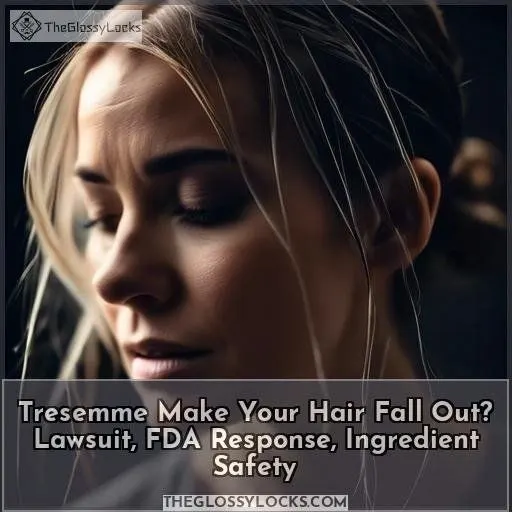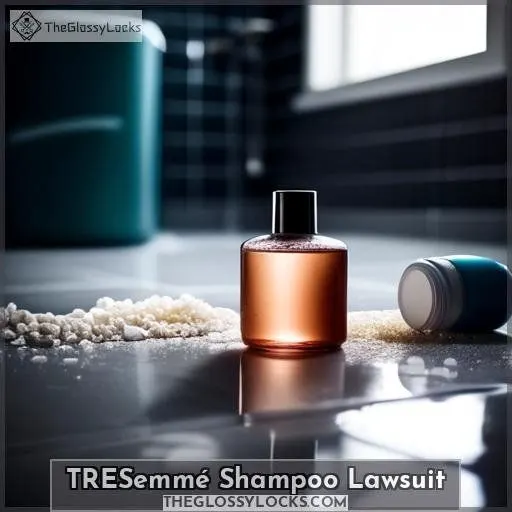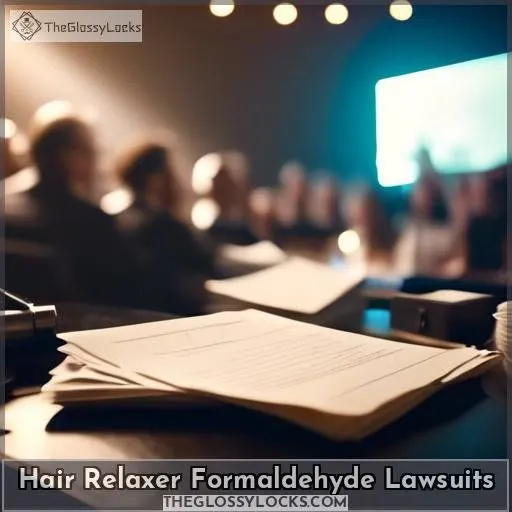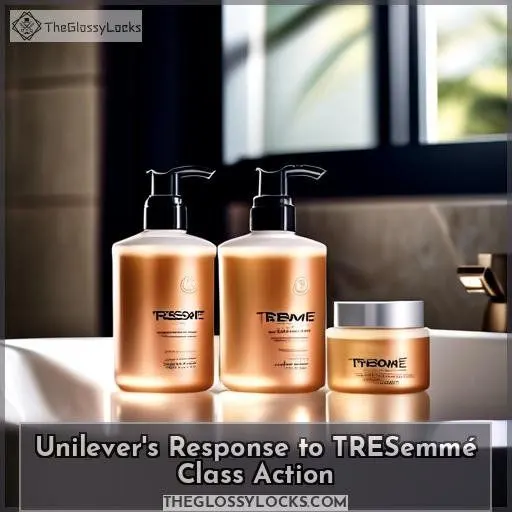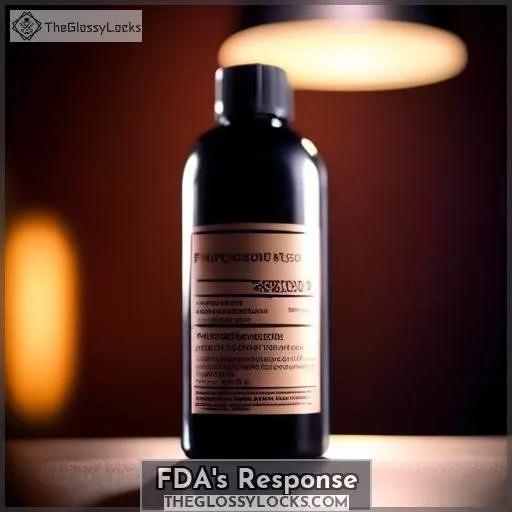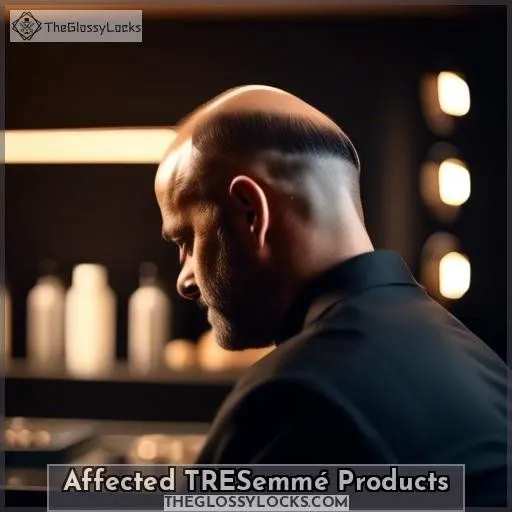This site is supported by our readers. We may earn a commission, at no cost to you, if you purchase through links.
A lawsuit alleges that Unilever falsely advertised TRESemmé products as safe, when in fact they contain formaldehyde, which can cause hair loss. This isn’t the only concern, as hair relaxer lawsuits link their use to uterine cancer, and some products contain carcinogens and hormone disruptors.
Unilever has been hit with a class action lawsuit over ingredient safety concerns, and the FDA is reviewing DMDM hydantoin, a formaldehyde-releasing preservative.
If you’re worried about your hair health, it’s imperative to be aware of these potential risks and consider alternative products.
Table Of Contents
- Key Takeaways
- TRESemmé Shampoo Lawsuit
- Hair Relaxer Formaldehyde Lawsuits
- Unilever’s Response to TRESemmé Class Action
- FDA’s Response
- DMDM Hydantoin & Ingredient Safety
- Consumer Advice
- Affected TRESemmé Products
- Frequently Asked Questions (FAQs)
- What is the status of the TRESemmé shampoo hair loss lawsuit?
- Are there any specific shampoo or conditioner recommendations for individuals experiencing hair loss?
- Why is DMDM hydantoin being removed from TRESemmé products?
- What are the potential health risks associated with DMDM hydantoin?
- How can consumers protect themselves from hair loss caused by personal care products?
- Conclusion
Key Takeaways
- Unilever is facing a class action lawsuit over the safety of TRESemmé shampoo, which is alleged to contain formaldehyde-releasing preservatives like DMDM hydantoin.
- The lawsuit claims that TRESemmé products can cause hair loss, burns, and scalp irritation due to the presence of these preservatives.
- The FDA is reviewing DMDM hydantoin and has the authority to regulate the ingredients in cosmetics and personal care products.
- Consumers are advised to be aware of the potential risks associated with TRESemmé shampoo and consider alternative products without harmful preservatives.
TRESemmé Shampoo Lawsuit
Have you been using TRESemmé shampoo and experiencing hair loss? If so, you’re not alone.
A lawsuit has been filed against Unilever, the manufacturer of TRESemmé. The plaintiff, Holly Schafer, alleges that Unilever falsely advertises their products as safe while concealing the presence of DMDM hydantoin. This preservative releases formaldehyde, a known carcinogen.
The lawsuit claims that TRESemmé products contain formaldehyde, which can cause hair loss, burns, and scalp irritation. This raises concerns about product safety and consumer concerns.
The plaintiff requests a jury trial for compensatory and punitive damages against Unilever.
The FDA has also responded to these allegations. It’s crucial to comprehend the potential risks associated with using TRESemmé shampoo.
Hair Relaxer Formaldehyde Lawsuits
Hair relaxer hazards have been a cause for concern, with studies linking the use of these products to uterine cancer. Researchers found that women who use chemical hair relaxers more than four times a year are twice as likely to get uterine cancer than those who don’t. The chemicals in hair relaxers, including parabens, Bisphenol A, heavy metals, and formaldehyde, can act as carcinogens or increase hormone levels, potentially leading to cancer.
Lawsuits have been filed against manufacturers for failing to warn about the dangers associated with hair relaxers. The cases have been consolidated into a multidistrict litigation (MDL), with nearly 8,100 lawsuits against L’Oreal USA Inc and other companies. Settlements or individual trials are possible in the future, with potential compensation including medical expenses, lost wages, and pain and suffering.
To reduce the risk of uterine cancer, women are advised to follow certain practices. These include wearing gloves, following instructions for application, not using relaxers when there’s an open sore on the scalp, and seeking professional help for hair styling. Additionally, reducing the frequency of relaxer use, maintaining a healthy weight, and engaging in regular physical activity can also help lower the risk of cancer.
It’s essential to be aware of the potential hazards associated with hair relaxers and take necessary precautions to protect one’s health.
Unilever’s Response to TRESemmé Class Action
Unilever, the parent company of TRESemmé, has been hit with a class action lawsuit in the United States District Court District of New Jersey. The plaintiff, Emily Castillo, alleges that Unilever falsely advertises its TRESemmé shampoo and conditioner lines as safe while concealing the presence of DMDM hydantoin, a preservative that releases formaldehyde, a known carcinogen. The lawsuit also claims that Unilever failed to warn customers about the risks associated with DMDM hydantoin and its potential link to hair loss, allergic reactions, and skin irritation.
In response to the lawsuit, Unilever hasn’t made any public statements regarding the allegations. However, the company has a history of promoting ingredient transparency, as seen in their 2019 announcement that they’d disclose fragrance ingredient information down to 0.01% of the product formulation, an industry first. This initiative provides consumers with access to detailed information about the ingredients used in their products, which could potentially address some of the concerns raised in the lawsuit.
Unilever’s response to the lawsuit will be closely watched by consumers and regulatory bodies, as it could set a precedent for how companies handle allegations of ingredient safety and transparency in the future.
FDA’s Response
The Food and Drug Administration (FDA) has been involved in addressing the safety concerns surrounding personal care products, including the use of DMDM hydantoin, a formaldehyde-releasing preservative found in some TRESemmé shampoos. The FDA has the authority to regulate the ingredients in cosmetics and personal care products, and the Personal Care Products Safety Act, introduced in 2015, aims to strengthen the FDA’s oversight of these products.
The Act requires cosmetic companies to register with the FDA and submit a thorough list of all ingredients used in their products. It also empowers the FDA to discontinue the distribution of and issue recalls for dangerous products. In determining which ingredients to evaluate for safety, the FDA considers factors such as prevalence, likely exposure, adverse event reports, and scientific studies from a wide range of sources.
The FDA has been working to review specific chemicals in personal care products, including formaldehyde-releasing preservatives like DMDM hydantoin. The first set of chemicals for review under the Personal Care Products Safety Act includes diazolidinyl urea, a preservative used in a wide range of products including deodorant, and methylene glycol/formaldehyde, which is used in hair treatments.
Unilever, the manufacturer of TRESemmé shampoo, has been accused of failing to warn consumers about the potential risks associated with DMDM hydantoin. The company has been aware of the side effects for years but didn’t provide adequate warnings, leading to lawsuits alleging negligence and failure to protect consumers.
In response to these concerns, the FDA has been working to strengthen its oversight of personal care products, including the review of specific chemicals like DMDM hydantoin. The Personal Care Products Safety Act provides a framework for this oversight, aiming to protect consumers and provide regulatory certainty for manufacturers.
DMDM Hydantoin & Ingredient Safety
As a customer, you may have questions about the safety of the ingredients in your hair care products, especially after the TRESemmé shampoo lawsuit alleging formaldehyde exposure. Let’s examine the safety concerns surrounding DMDM Hydantoin, a preservative found in TRESemmé products.
- Formaldehyde Exposure: DMDM Hydantoin is a formaldehyde-releasing preservative, which means it can cause formaldehyde exposure when applied to the scalp. This exposure can lead to hair loss, burns, and scalp irritation.
- Hair Health: Prolonged use of hair care products containing DMDM Hydantoin can have serious effects on hair health, causing scalp irritation and potentially leading to hair loss.
- Ingredient Regulation: The FDA hasn’t yet banned DMDM Hydantoin, but there are concerns about its safety and the lack of regulation in the hair care industry.
As a mindful consumer, it’s crucial to be aware of the potential risks associated with DMDM Hydantoin and other formaldehyde-releasing preservatives. Always check the ingredients in your hair care products and consider discontinuing use if DMDM Hydantoin is present. Explore alternative hair care products without harmful preservatives to protect your hair health and scalp.
Consumer Advice
If you’ve been using Tresemme shampoo and conditioner and experiencing hair loss or scalp irritation, it’s paramount to take action. Initially, stop using the products immediately. If you’ve noticed any other symptoms, such as thinning or lesions, it’s imperative to see a primary doctor for blood work. Wash your hair daily with a gentle shampoo and consider taking multivitamins. Additionally, consult a dermatologist for further evaluation and treatment options.
In terms of product safety, it’s essential to be aware of ingredients, especially those like DMDM hydantoin, which is under scrutiny due to its chemical similarity to formaldehyde. As a consumer, you have the right to know what’s in your products and their potential risks. If you’re concerned about endocrine disrupting chemicals, consider exploring alternative hair care products without harmful preservatives.
The legal implications of these issues are significant. Companies like Unilever, makers of Tresemme, have a responsibility to warn users of potential risks and provide safe alternatives. If you’ve been affected, you may be eligible for compensation. Marketing experts and suave professionals can provide valuable insights into your options. Remember, your health and safety are paramount, and consumer protection laws are in place to ensure that.
Affected TRESemmé Products
If you’ve been using TRESemmé shampoo and conditioner, you may want to examine the ingredients list for DMDM hydantoin. This preservative has been linked to hair loss, allergic reactions, and skin irritation. It has also been found to release formaldehyde, a known carcinogen. If you’re concerned about your hair care products, here are three things to contemplate:
- Check the ingredients: Look for DMDM hydantoin in your TRESemmé products. This preservative is found in several TRESemmé shampoos and conditioners, including the 24 Hour Volume Shampoo, 24 Hour Body Conditioner, Clean & Natural Shampoo, Clean & Natural Conditioner, Expert Keratin Smooth Shampoo, Expert Keratin Smooth Conditioner, Moisture Rich Shampoo, and Expert Keratin Smooth Conditioner.
- Explore alternatives: If you’re concerned about the formaldehyde content in your shampoo, search for preservative-free or natural alternatives. Many hair care brands offer products without harmful preservatives.
- Stay informed: Consumer awareness is pivotal in relation to product safety. Remain abreast of the most recent research and news regarding hair care products and their potential health risks.
Frequently Asked Questions (FAQs)
What is the status of the TRESemmé shampoo hair loss lawsuit?
The TRESemmé shampoo hair loss lawsuit is ongoing. The plaintiff, Holly Schafer, is claiming that Unilever falsely advertises its products as safe while concealing the presence of DMDM hydantoin, a preservative that releases formaldehyde, a known carcinogen.
The lawsuit seeks compensatory and punitive damages for hair loss, burns, and scalp irritation.
The case is being heard in the United States District Court District of New Jersey.
Are there any specific shampoo or conditioner recommendations for individuals experiencing hair loss?
For individuals experiencing hair loss, there are several shampoo and conditioner recommendations that may help. Dr. Jennifer Ashton, ABC News’ chief medical correspondent and a board-certified obstetrician and gynecologist, suggests using natural remedies like coconut oil, which has been shown to potentially help prevent hair loss.
Additionally, massaging the scalp can help increase blood flow and boost hair growth. Some anti-dandruff shampoos, such as those containing ketoconazole, may also help improve hair health and prevent inflammation.
It’s essential to consult with a healthcare provider to identify the cause of hair loss and determine the best course of action.
Why is DMDM hydantoin being removed from TRESemmé products?
Imagine your favorite jeans shrinking after a wash; that’s how users felt about TRESemmé. They’re ditching DMDM hydantoin due to its link to hair loss and scalp irritation, prioritizing your mane’s health and happiness.
What are the potential health risks associated with DMDM hydantoin?
DMDM hydantoin is a preservative found in various cosmetics and hair care products. It is classified as a formaldehyde donor, which means it releases small amounts of formaldehyde over time to help keep products fresh and free from contaminants. Formaldehyde is a known carcinogen and has been linked to allergic reactions, hair loss, scalp irritation, and other health concerns.
While current findings suggest that it takes long-term exposure to higher doses of formaldehyde to increase health risks, it is still recommended to avoid products with DMDM hydantoin if you are allergic to formaldehyde or prone to dermatitis.
How can consumers protect themselves from hair loss caused by personal care products?
To protect yourself from hair loss caused by personal care products, check for DMDM hydantoin and consider discontinuing use if it’s present. Explore alternative hair care products without harmful preservatives.
Conclusion
Imagine losing your hair without even realizing it’s due to the products you’re using. Well, that’s the reality for some TRESemmé users, as a lawsuit alleges the brand falsely advertises its products as safe, containing ingredients like formaldehyde that can cause hair loss.
The FDA is reviewing DMDM hydantoin, a formaldehyde-releasing preservative, and Unilever faces a class action lawsuit.
Don’t let your hair health be compromised; consider alternative products to avoid the potential risks.

